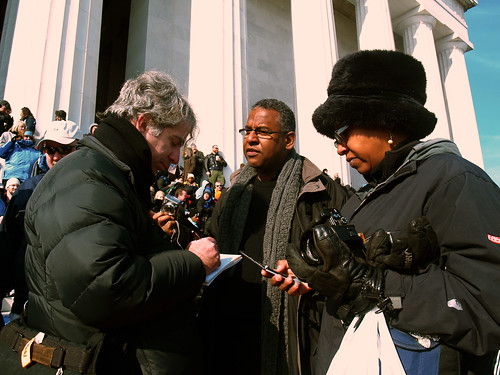Wednesday, April 8, 2009
Assignment 3a
We’ve had this debate going on for a while, my journalism professor and I, on what the definition of journalism is.
Unlike the majority of my classmates, I am not a journalism major. I study this strange hybrid field of humanities and social sciences referred to as American Studies at a different school. There are a lot of things an American Studies major can focus on and I chose to go with the closest thing I could cobble together that seemed like a media studies program in a communications school.
Now, in my last semester, it is clear to me that my focus has been what they call “cultural studies” – a field that, in no shortage of "American Studies" irony to me – is populated with theorists who are predominantly German (Benjamin, Horkheimer, Adorno), British (Stuart Hall), or French (oh Foucault, we cannot escape you even when we try).
So I don’t come to the table as a journalism student, but someone who instead has an immense respect for journalisms’ role in democracy. (Us American Studies majors all tend to spend a lot of time thinking and writing about democracy). And I am versed in the negative impact that free-market theory has had on the news industry in America. Despite the immense promise of the Internet for providing new sources of news and information, 40% of the people in this country do not have access to high-speed Internet. And those divisions largely fall along racial and class lines. Today’s Internet doesn’t run on dial-up. (If you don't believe me, watch this video).
The majority of people are still getting their news and information from “traditional” sources – like newspapers, television, and radio. The same sources that are predominantly controlled by the same six companies across the board. What we need most is a diversity of perspectives and boots on the ground reporting on what is happening in local communities. What we’ve got are behemoths like Clear Channel and Tribune who have gotten so big through decades of deregulation in Washington.
The commercial media industry’s deep pockets have continued to buy off policy makers, while the rest of us have to suffer through syndicated drivel in the form of talk radio and reality television. The reason? Because paying for reporters is expensive. And these companies don’t feel they have a responsibility to the public interest. Their responsibility is to their shareholders. Why pay for journalism when you can get a part-time critic to talk about the latest microbrews on tap at the hipster bar?
Which brings me back to the debate at hand: what is journalism? Note that the question is not “who is a journalist?” as I think that is an entirely different issue and at this moment in time it is a moving target. But our disagreement on “what is journalism” appears to center around a fundamental disconnect between the ideas of critique and commentary and reporting and information.
Journalism is about accountability. And we are experiencing first hand the results of a press who does not perceive their responsibility to be asking tough questions to those in power. What has our press been doing when we’ve needed it most?
But coming back to our classroom debates, I can boil this down to a simple question. Can someone to explain to me how a restaurant or music or book review is journalism? There is a stark difference between reading about how the mashed potatoes made someone feel and a report about where the potatoes are coming from and how a new tax is impacting the restaurant expenses and forcing it switch to a new provider for potatoes. One tells me where to have dinner, the other helps me understand critical issues relating to government, commerce, and community.
It’s not that I don’t value a good review, and it’s certainly not that I don’t understand how they impact our understanding of the world around us. I love music, culture, satire, and all the nuanced splendor that makes the American experience so messy and complex. But I’m not foolish enough to claim that my opinion about the new Animal Collective disc is journalism. I wouldn’t call this blog entry journalism. In fact, I produce a weekly radio show that has national syndication and features stories about public policy and activism and I wouldn’t call that journalism either. Journalism is where the hard questions get asked. It’s how we keep powerful entities in check. It is the Fourth Estate. And this is the reason that it is a profession protected by the Constitution.
So what gives, people? You are all students of journalism, you are privy to details that I know nothing about and a history that I have only scratched the surface of. Someone tell me where the line was crossed? At what point did we just start deeming everything that was published in a newspaper as journalism?
Next thing you know someone is going to start telling me that advertising is journalism.
Or horoscopes.
Subscribe to:
Post Comments (Atom)


I feel like you have a pretty conservative view of what journalism is and is not. Does it have to come from an authoritative source and be written in a traditional prose form? I disagree with you, I feel that CD reviews and writing of the like are journalistic. Journalism can inject opinion sometimes and be legitimate. Journalism is an all-encompassing communicator.
ReplyDelete